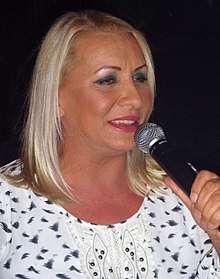Vesna Zmijanac
Vesna Zmijanac (Serbian Cyrillic: Весна Змијанац; Serbian pronunciation: [ʋêsna zmijǎːnats]; born 4 January 1957) is a Montenegrin-born Serbian folk singer.[1] Having sold millions of records and several regional tours she is recognized as one of the most popular Yugoslavian singers. Zmijanac became known for her emotional vocal delivery and melancholic ballads, thus often dubbed the "Queen of sadness". In addition she was noted as the sex-symbol and fashion icon of the eighties.
Vesna Zmijanac | |
|---|---|
 Zmijanac performing in 2011 | |
| Background information | |
| Birth name | Vesna Zmijanac |
| Born | 4 January 1957 Nikšić, PR Montenegro, FPR Yugoslavia |
| Genres | Folk |
| Occupation(s) |
|
| Instruments | Vocals |
| Years active | 1979–present |
| Labels | |
| Associated acts | |
Life and career
Vesna Zmijanac was born on 4 January 1957 in Nikšić, PR Montenegro, FPR Yugoslavia to father from Sisak, Croatia and mother from Kraljevo, Serbia. Her parents divorced when she was just a year old as they believed that they were too young to be married. Subsequently, Zmijanac was raised by her maternal grandmother because her parents went abroad to work. Zmijanac was discovered by singer Šaban Šaulić as a teenager living with her mother in Vienna, Austria. She also cites Esma Redžepova and Safet Isović next to Šaulić as the biggest influences on her vocal performance.
Zmijanac released her debut single in 1979, but rose to prominence in the early eighties by appearing in popular television movies and series as a singer. She then released her first album, Ljubi me, ljubi, lepoto moja (Kiss Me, Kiss Me, My Beauty), under PGP-RTS, which saw moderate success. Zmijanac scored her first hit in 1985 with "Nevera moja" (My Infidelity), written by her then husband Miroljub Aranđelović Kemiš.[2] The following year she released her fifth record, Dođi što pre (Come As Soon As You Can), which sold over 600,000 copies. During this period she had her first national tour and was recognised as one of the biggest artists in the former Yugoslavia, only competing with Lepa Brena. Zmijanac saw success again with Jedan si ti (You're One of a kind) in 1987. Istina (The Truth) was then released in 1988, which knowably included a duet with then less known Bosnian singer-songwriter Dino Merlin, titled "Kad zamirišu jorgovani" (When Lilacs Smell). The album marked her biggest success, overall selling record-breaking 1,1 million copies according to Zmijanac.[3] On October 19 the following year, she gave birth to daughter Nikolija, while married to Vladimir Jovanović, who at the time worked as the marketing chief at PGP-RTS.[4]
In 1990, she had another best-selling album with Svatovi, but under new label Komuna. Zmijanac then embarked on her fourth tour when she sold out ten concerts in a row in Belgrade's Sava Centar. In 1994, Zmijanac released Idem preko zemlje Srbije (I'm Going Ove the Country of Serbia), followed by another regional tour. Malo po malo (Little by Little) was then released in 1995 under Diskos. In 1997, she released Posle svega, dobro sam (After Everything, I'm Fine), where she collaborated with rock musician Bajaga on Da budemo noćas zajedno (To Be Together Tonight).
In 2000, she published her autobiography. Zmijanac subsequently released Šta ostanu kad padnu haljine (What's Left When Dresses Have Fallen) under Grand Production in 2003. The album's title track was written by Željko Joksimović.
In 2010, Zmijanac took part in the reality TV series Survivor Srbija VIP: Philippines broadcast on TV Prva alongside her daughter, where she was second contestant to be voted out. Zmijanac also appeared in the seventh season of Farma on RTV Pink in 2016. She eventually walked out from the show, after receiving news about Nikolija being pregnant.[5]
Discography
- Studio albums
- Ljubi me, ljubi, lepoto moja (1982)
- Ti mali (1983)
- Šta će meni šminka? (1983)
- Zar bi me lako drugome dao (1985)
- Dođi što pre (1986)
- Jedan si ti (1987)
- Istina (1988)
- Svatovi (1990)
- Ako me umiriš sad (1992)
- Idem preko zemlje Srbije (1994)
- Malo po malo (1995)
- Posle svega, dobro sam (1997)
- Šta ostane kad padnu haljine (2003)
- Sve Za Ljubav (2011)
References
- "Vesna Zmijanac: UMREĆU pevajući!". Archived from the original on 14 May 2017.
Velika srpska folk zvezda Vesna Zmijanac
- "Zorica i Vesna opet drugarice! Pevačice ratovale 29 godina zbog Kemiša". Blic.rs (in Serbian).
- "Vena Zmijanac: Skraćujem aplauze da stane više pesama na koncertu" (in Serbian).
- "Nikad se ne pojavljuje u javnosti! Ovo je bivši muž Vesne Zmijanac sa kojim ima ćerku". Blic.rs (in Serbian).
- "Vesna Zmijanac saznala da će postati baka pa napustila Farmu". Blic.rs (in Serbian).